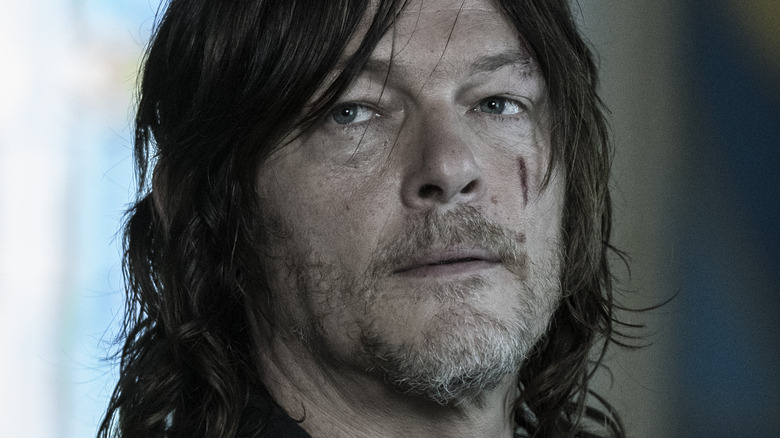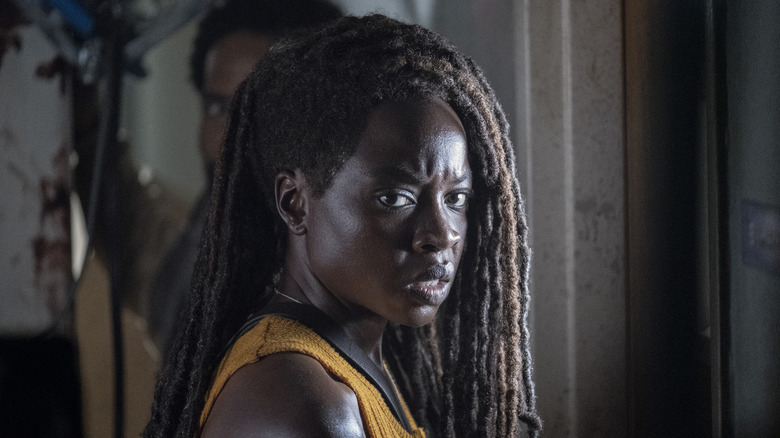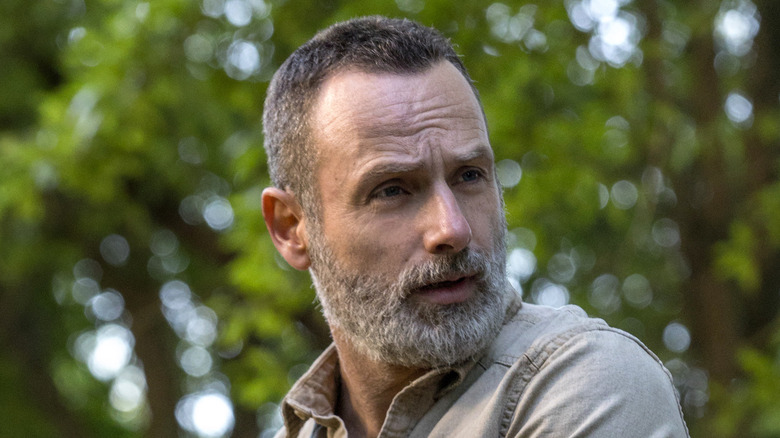As The Walking Dead Prepares To Meet Its Grave, This Is The True Legacy It Leaves Behind
The joke about "The Walking Dead" resembling its titular totally-not-zombies in its complete refusal to die is well worn, and somewhat outdated now that Season 11 will be the show's final season. Then again, it's also a perfectly apt comparison. This is an undead-themed show that started at the height of the zombie's domination of the cultural zeitgeist (via Vox). It's survived things that should by all rights kill your average show — like randomly spending its sophomore season on a single farm — and has even managed to spread the contagion with a frankly outrageous number of spin-offs.
Regardless of how you feel about the show's quality, sheer quantity and longevity alone have guaranteed that "The Walking Dead" will leave a legacy in the annals of popular culture. Predicting how any work of entertainment will be thought of in a few years' or decades' time is always tricky, but there are already signs that might provide hints about "The Walking Dead's" eventual place in history. Let's take a look at them.
The Walking Dead wrote the book on using horror as an effective background element in a mainstream show
"Humans are the real monsters" is a common moral lesson in a horror setting, and with factions like Terminus, the Ferals and the Whisperers, "The Walking Dead" certainly embraces the concept. However, what makes the show so unique is that for much of its runtime, the dead are little more than a background element. Though always present, their threat is a basic fact of life that needs to be dealt with, like sleeping and eating — and as long as the characters take proper precautions, they can handle the dead just fine. It's the living who are the problem.
For lengthy periods, "The Walking Dead" is just like any post-apocalyptic show, with factions that mostly preoccupy themselves with supplies, survival, and clashing with each other. In these moments, the show doesn't really differ from any other piece of post-apocalyptic fiction. Just like so many other representatives of the genre, "The Walking Dead" is essentially the story of what people do after the worst has already happened to them. In this particular aftermath, there just happens to be the occasional undead or 50.
In addition to giving the show all the tools any other work of post-apocalyptic fiction has at its disposal, this approach gives "The Walking Dead" a secret weapon. The fact that the walkers constantly lurk on the periphery means that the show can suddenly bring them to the forefront whenever it wants to. Because of this, mundane doesn't really exist, even when the show seems to proceed at a snail's pace. At any given moment, any old oil tank, revolving door, or dumpster can suddenly become the setting of an impromptu horror movie when the show needs a jolt of electricity. Really, it's no wonder AMC feels the need to introduce as many "The Walking Dead" spin-offs as humanly possible. How many other shows have that kind of instant adrenaline shot built in their very premise?
The Walking Dead is a surprise lesson in franchise-making
To truly establish "The Walking Dead's" franchise legacy, one of the spin-offs should eventually become the "Better Call Saul" to the original's "Breaking Bad." Unfortunately, the search is still ongoing as the parent show is coming to a close. Based on its all-important Rotten Tomatoes audience score of 59 percent, the clearest contender, "Fear the Walking Dead," isn't going to be the successor to the flagship show's crown. (For reference, despite all the fan criticism and outrage "The Walking Dead" draws, it still boasts a Rotten Tomatoes audience score of a cool 78 percent.) Time will tell how the other contenders will fare.
"The Walking Dead's" franchise-making moves are as bold as they are random. It's way too early to tell whether upcoming shows like "Daryl Dixon" or that eventual "Rick & Michonne" series will be hits or misses — but even if the original show will forever remain its crown jewel, "The Walking Dead" franchise will at the very least go down in history as one that wasn't afraid to see how big its world can be. This is admirable, because even the most powerful TV franchises can easily overstep — just ask the "CSI" franchise about "CSI: Cyber," or the "One Chicago" universe about "Chicago Justice."
Meanwhile, "The Walking Dead" is gleefully throwing things at the wall, and seems intent on doing so until something sticks. Really, the few franchises that have pushed the fatigue envelope more than "The Walking Dead" in recent years are of the "Star Wars" and the Marvel Cinematic Universe variety, as well as The CW's Arrowverse. You'll note that all of the above have the benefit of decades of beloved IP under their belt, which provides more than enough fan goodwill to build on. "The Walking Dead" operates on a smaller scale, sure ... but it's built its ever-growing legacy with nothing but a single black-and-white comic to lean on. That, alone, is worth a tip of pop culture history's hat.


